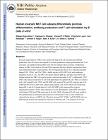| dc.contributor.author | O'REILLY, VINCENT | en |
| dc.date.accessioned | 2014-12-01T14:21:06Z | |
| dc.date.available | 2014-12-01T14:21:06Z | |
| dc.date.issued | 2013 | en |
| dc.date.submitted | 2013 | en |
| dc.identifier.citation | Zeng SG, Ghnewa YG, O'Reilly VP, Lyons VG, Atzberger A, Hogan AE, Exley MA, Doherty DG, Human invariant NKT cell subsets differentially promote differentiation, antibody production, and T cell stimulation by B cells in vitro., Journal of immunology (Baltimore, Md. : 1950), 191, 4, 2013, 1666-76 | en |
| dc.identifier.other | Y | en |
| dc.identifier.uri | http://hdl.handle.net/2262/72338 | |
| dc.description | PUBLISHED | en |
| dc.description.abstract | Invariant NK T (iNKT) cells can provide help for B cell activation and Ab production. Because B cells are also capable of cytokine production, Ag presentation, and T cell activation, we hypothesized that iNKT cells will also influence these activities. Furthermore, subsets of iNKT cells based on CD4 and CD8 expression that have distinct functional activities may differentially affect B cell functions. We investigated the effects of coculturing expanded human CD4(+), CD8α(+), and CD4(-)CD8α(-) double-negative (DN) iNKT cells with autologous peripheral B cells in vitro. All iNKT cell subsets induced IgM, IgA, and IgG release by B cells without needing the iNKT cell agonist ligand α-galactosylceramide. Additionally, CD4(+) iNKT cells induced expansions of cells with phenotypes of regulatory B cells. When cocultured with α-galactosylceramide-pulsed B cells, CD4(+) and DN iNKT cells secreted Th1 and Th2 cytokines but at 10-1000-fold lower levels than when cultured with dendritic cells. CD4(+) iNKT cells reciprocally induced IL-4 and IL-10 production by B cells. DN iNKT cells expressed the cytotoxic degranulation marker CD107a upon exposure to B cells. Remarkably, whereas iNKT cell subsets could induce CD40 and CD86 expression by B cells, iNKT cell-matured B cells were unable to drive proliferation of autologous and alloreactive conventional T cells, as seen with B cells cultured in the absence of iNKT cells. Therefore, human CD4(+), CD8α(+), and DN iNKT cells can differentially promote and regulate the induction of Ab and T cell responses by B cells. | en |
| dc.format.extent | 1666-76 | en |
| dc.language.iso | en | en |
| dc.relation.ispartofseries | Journal of immunology (Baltimore, Md. : 1950) | en |
| dc.relation.ispartofseries | 191 | en |
| dc.relation.ispartofseries | 4 | en |
| dc.rights | Y | en |
| dc.subject | Invariant NK T (iNKT) cells | en |
| dc.title | Human invariant NKT cell subsets differentially promote differentiation, antibody production, and T cell stimulation by B cells in vitro. | en |
| dc.type | Journal Article | en |
| dc.type.supercollection | scholarly_publications | en |
| dc.type.supercollection | refereed_publications | en |
| dc.identifier.peoplefinderurl | http://people.tcd.ie/oreillv | en |
| dc.identifier.rssinternalid | 89296 | en |
| dc.rights.ecaccessrights | openAccess | |
| dc.subject.TCDTheme | Immunology, Inflammation & Infection | en |




